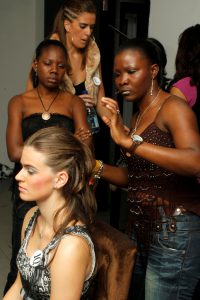Humanitas Afrika launched a creative initiative last year to promote positive Africa in the Czech Republic. Around Africa in a Month is a platform of constructive dialogue to discuss serious issues that showcase the various contributions that the African Diaspora communities are making to the development of Africa and Europe. In this first interview in a series, Martha Ronke Ayorinde (43), a Nigerian by origin, talks about her life in the Czech Republic and how she is contributing to the economic development of the country.
When did you arrive in the Czech Republic and what brought you here?
I came here in 2000 to live with my mother, Mrs Julie Joke Ayorinde, who was then the Nigerian ambassador to the Czech Republic. When her tenure ended as ambassador, I decided to stay here, on my own.
How did you manage to adjust to your new environment without speaking the Czech language at the beginning, and what is one of your most unforgettable first impressions?
Without speaking the Czech language, it was very difficult for me in the beginning as everything was in Czech. But once I made up my mind to stay, I prepared myself to face the challenge and adapt quickly.
One of the funniest moments still on my mind was when I started living here. I did not know much about Czech food so it was difficult for me to shop and cook. In trying to find a way out, I came to like a particular Czech bread because the taste was similar to a bread that I liked back in Nigeria. One day I went to a shop and the bread was not at the usual place on the shelf. In Czech the bread is called babovka, but while inquiring from the shopkeeper, I mispronounced it and said I wanted babicka, which in Czech means grandma. Of course he did not understand me until I went out to call my mother’s chauffeur, who was Czech to come and explain what I wanted. In the end we all laughed over it but it was a good lesson.
What do you do for a living?
I am a trained beautician and I work as a hairdresser and a consultant for hair and make-up.
Do you feel at home here in the Czech Republic?
Please remember I arrived in my youthful years so I grew up partly here. Now I have a business here and have some peace and stability. My first child, a three-year-old girl, was born here. Yes, I feel at home here. I see the Czech Republic as my home and Nigeria as my home too.

In what way through your work are you contributing to the socio-cultural and economic development of the Czech Republic?
I set up this business, Martha’s Inspiration and Hairdressing Salon, and have been running it for more than 10 years now. The saloon gives me work and I also offer job opportunities and training to others. By paying taxes for myself and the business, and for the others who work for me, I am contributing to the economic development of this country. I provide employment opportunities to some Africans and that helps with their integration into Czech society; and not only Africans because my accountant, for example, is a Czech. Moreover, I contribute to the enrichment of the multicultural environment with an ethnic business that caters for both Africans and Czechs and any other person who needs it. For example, I play a useful role in providing advice to parents and children from bi-racial families as to which cosmetics are suitable for them.
How do you see yourself – an African, Afro-Czech or a Czech?
Well my family and friends back home say that my mentality and way of doing things now have become like that of a Czech. My Czech friends in many instances also see a real African in me. In that context, I can conveniently describe myself as an Afro-Czech.
Kofi Nkrumah
 THE AFRICAN COURIER. Reporting Africa and its Diaspora! The African Courier is an international magazine published in Germany to report on Africa and the Diaspora African experience. The first issue of the bimonthly magazine appeared on the newsstands on 15 February 1998. The African Courier is a communication forum for European-African political, economic and cultural exchanges, and a voice for Africa in Europe.
THE AFRICAN COURIER. Reporting Africa and its Diaspora! The African Courier is an international magazine published in Germany to report on Africa and the Diaspora African experience. The first issue of the bimonthly magazine appeared on the newsstands on 15 February 1998. The African Courier is a communication forum for European-African political, economic and cultural exchanges, and a voice for Africa in Europe.






























